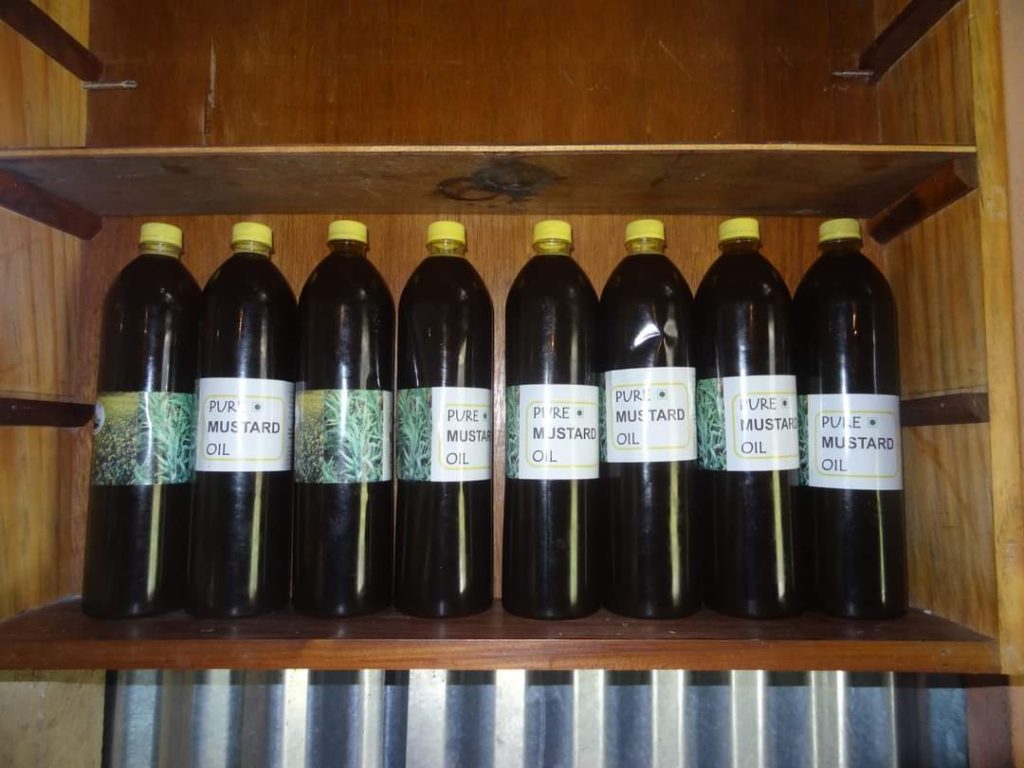Mustard plantations to address country’s cooking oil self-sufficiency
Sonam Dorji Subba, 24-years-old once tasted curry – using locally produce mustard oil in Gozhi village under Dagana district, while he was working as a member in the farmer’s sale outlet. The taste piqued his interest in preserving mustered oil from farmers and selling them locally and abroad.
Recently, he started using the oil pressing machine house near his village, a machine that processes about 40 liters of mustard oil. These are filtered in bottles measuring 900mls.
Sonam Dorji said his aim was not only to earn income but also to provide a market to small-scale farmers, help them reduce post-harvest losses, and drive consumption of healthy oil.
“The mustard oil business is among the growing number of rural areas,” he said, adding that there isn’t a single farmer operating an oil press machine in the village.
He shared that farmers have piled up tons of mustard seeds, and with my initiative, the machine is expected to benefit at least 100 households where they no longer have to buy imported edible oil.
Sonam started the mustard oil business with a total investment of Nu 50,000 and he expected to produce 100 liters of pure mustard oil without using any other ingredient. “It was introduced with the motive of making our country less dependent on the import of edible oil and also if I could help in reviving the indigenous crop species.”
There is also a difference in the measurement of oil, he shared that the bottle measures 900mls, whereas the oil bottles from India are only 750ml, that’s the reason a liter of mustard oil costs Nu 250.
In addition, he said that farmers put in their time, effort, and resources to plant, do weeding, and harvest their produce but have challenges in accessing markets. As a result, their produce goes to waste, incurring financial losses, unable to expand their businesses and provide basic needs for their families.
“In the long run, the mustard oil business will substitute oil imports, sold in local markets in large,” he said, adding that he started reaching consumers through digital platforms, before finding spot-on local market shelves.
“I recently started selling to mainstream retail outlets like markets in Thimphu and others to grow the oil sales. There is a lot of potential with over one million customers yet to be reached,” he said.
Despite having a fairly successful venture, the business has had its fair share of highs and lows, which he says are learning lessons.
“What has made the business remain resilient despite the challenges is having a strategic plan that guides our actions and helped us remain focused even when we feel like giving up,” he said.
Among the challenges the oil business has faced are the high cost of packaging, access to affordable credit, and market access to big outlets like supermarkets.
Sonam shared that mustard has an antiquity of being used as a spice for thousands of years and as a medicinal plant during the middle age periods.
In Autumn, when the fields bloom yellowish in color – mustard flowers. In the village, it is primarily black mustard (Brassica nigra). The first leaves of the mustard plant can be harvested 2-3 weeks after germination.
The mustard seeds are dried for almost 4–5 weeks, Sonam said that the clean mustard seed is heated and put in the pressing machine. Finally, it is filtered from the extracted oil to remove impurities.
“The left-over residue, also known as mustard seed oil cake, plays an essential role in farming, where it is used to feed the animals and plantations as it is rich in protein,” he said, adding that mustard seed plays a vital role not only for oil but also for animal feeds.
An entrepreneur said that everyone prefers pure organic products, and one of his motivations for introducing his mustard oil product was to achieve 100% pure organic in the country.
He said that producing oil is not very difficult, but the most challenging part is collecting the seeds because most people lose interest in cultivating the mustard due to a lack of proper marketing.
He also said that because his business is still in its early stages, he cannot produce seed of his own and must instead obtain it from villagers and another village.
However, the Gewog administration intends to supply mustard seeds to the villager beginning next year. He was being helped by officials from the Dagapela post-harvest center.
“To encourage farmers to work in the production of mustard plants, and I also want to encourage youth to develop and come up with their business ideas,” he said.
To inspire young entrepreneurs, Sonam Dorji Subba has one message: “Start small, don’t give up despite the challenges, and always remember the problem you are solving at the back of your mind,” he said.
Nidup Lham from Thimphu














